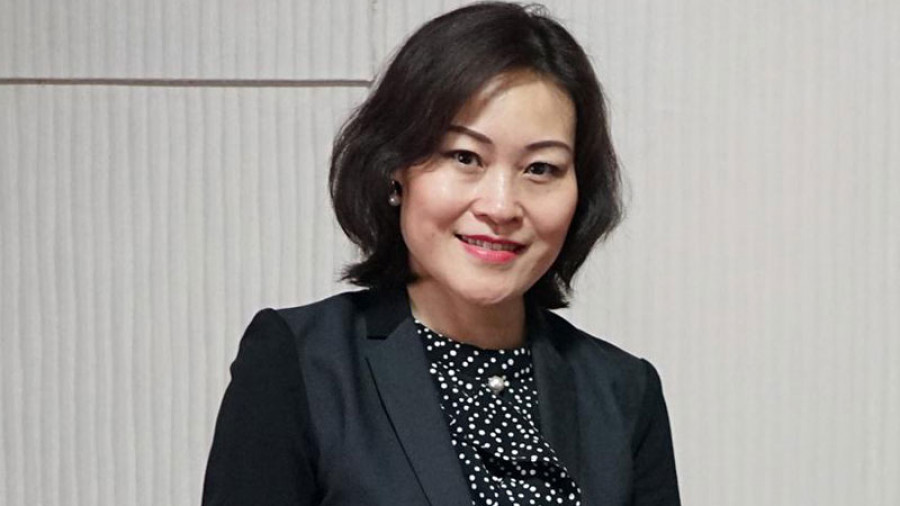Politics
In a series of meetings, Chinese envoy calls for unity among ruling party members
Analysts say that while China is interested in keeping the Nepal Communist Party intact, it doesn’t have any preferences when it comes to who leads the government.
Anil Giri
Days ahead of a crucial Nepal Communist Party meeting, Chinese Ambassador Hou Yanqi held a series of meetings with senior Nepal Communist Party leaders, expressing concern over the ongoing power play within the ruling party and seeking support to act as a bulwark against an international movement targeting China.
On Thursday Hou called on Prime Minister KP Sharma and on Friday she met with Nepal Communist Party (NCP) chair Pushpa Kamal Dahal and senior leader Madhav Kumar Nepal, both former prime ministers.
According to individuals familiar with the meetings, Hou discussed three primary issues—the ongoing internal crisis in the ruling party, China’s assistance to Nepal to fight Covid-19, and Nepal’s support against the international politicisation of Covid-19 where a number of countries, including the United States, are trying to hold China accountable for the pandemic.
Hou’s series of meetings precede a crucial ruling party Secretariat meeting on Saturday, although the exact substance of her talks with the ruling party leaders is unclear, given that the Foreign Ministry was not informed beforehand and no representative of it was present during the meetings.
“As per the diplomatic code of conduct, Foreign Ministry officials should be present at such meetings, but we were not informed,” a ministry official told the Post on condition of anonymity. “So there are no institutional records of the meetings and we don’t know what the talking points were.”
The Chinese Embassy in Kathmandu described the meetings as regular working communications.
“Both sides exchanged views on fighting the Covid-19 pandemic and other issues related to bilateral relations,” a Chinese Embassy spokesperson told the Post.
Many say the Chinese ambassador’s meetings come at an interesting time, as Oli is facing a tough time from party factions led by Dahal and Nepal.
Oli’s position in the party has become so tenuous that Dahal, Nepal and senior leader Jhala Nath Khanal have all asked him to resign, leading to fears among party members that the party could split.
“We should see these meetings in three contexts. One, China’s diplomatic outreach after the Covid-19 outbreak; second, China’s medical and other assistance to Nepal; and third, China’s interest in the emerging political situation in our party,” said Bishnu Rijal, deputy chief of the party's international relations department.
According to Rijal, Beijing is concerned over disputes in the ruling party.
“They have been advising us to remain united and not indulge in disputes,” Rijal told the Post. “They have also suggested that top leaders take into account the people's verdict, peace and development.”
Hou’s meetings with ruling party leaders came on the heels of Chinese President Xi Jinping’s telephone conversation with President Bidya Devi Bhandari earlier this week. While offering assistance to Nepal in the fight against Covid-19, Xi also discussed bilateral cooperation and Nepal-China affairs.
The Chinese Foreign Ministry said in a statement that Xi expressed confidence that the Nepali government and people will beat the virus at an early date, under the leadership of President Bhandari and Prime Minister Oli.
“Xi said that after the defeat of Covid-19, the two sides should continue to implement the consensus on cooperation in various fields reached by the two leaders during their mutual visits last year, and advance the sustained growth of the China-Nepal strategic partnership of cooperation,” reads the statement.
One ruling party leader said that Xi’s telephonic conversation with his Nepali counterpart, followed by his diplomat’s meetings with top ruling party leaders, shows that Beijing stands with the Oli government.
“Beijing also wants to assert that it attaches equal importance to all leaders of the ruling party,” the leader told the Post on condition of anonymity.
The ruling Nepal Communist Party was born out of a merger between Oli’s CPN-UML and Dahal’s Maoist Centre in May 2018, something that many believe was supported by the Chinese following a period of tumult in Nepal after the promulgation of the constitution in 2015 and the subsequent Indian blockade.
The ruling Nepal Communist Party and the Communist Party of China have since strengthened ties and increased bilateral visits.
A month ahead of President Xi’s visit to Nepal in October, the Nepal Communist Party organised a symposium and invited Chinese Communist Party leaders to share Xi’s doctrine with over 200 of its party members.
Though there were concerns over whether Beijing was exporting its political doctrine to Nepal—or the Nepal Communist Party was trying to emulate the Chinese Communist Party–leaders had said it was just a “knowledge-sharing” exercise.
While China has increased its presence in Nepal in recent years, primarily via aid and numerous big-ticket projects, it has remained cautious about not interfering in Nepal’s internal matters.
Nepal receives the highest amount of foreign direct investment from China
While Nepal has committed to the ‘One-China’ policy, a stable Nepal has been Beijing’s reiteration.
But over the last 10 days, politics in Nepal has taken a new turn, with leaders from the ruling Nepal Communist Party turning against their own prime minister.
“The Chinese are worried about the ruling party’s internal politics and concerned about the possible breaking of the current power equation,” said Rupak Sapkota, a China watcher and deputy executive director of the Institute of Foreign Affairs, a governmental foreign policy think tank. “The meetings [by the Chinese envoy] at this time could be to take stock of what’s going on.”
According to Sapkota, the Chinese would like to see an intact communist party.
“Due to ideological closeness, naturally the Chinese prefer a communist government in Nepal,” Sapkota told the Post. “But I don’t think they have any preferences when it comes to who leads the government.”




 23.41°C Kathmandu
23.41°C Kathmandu















